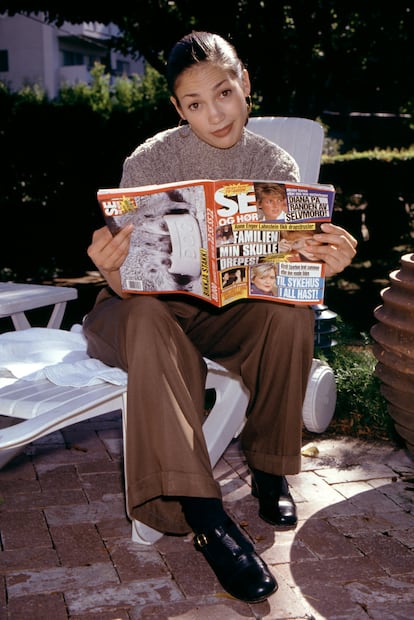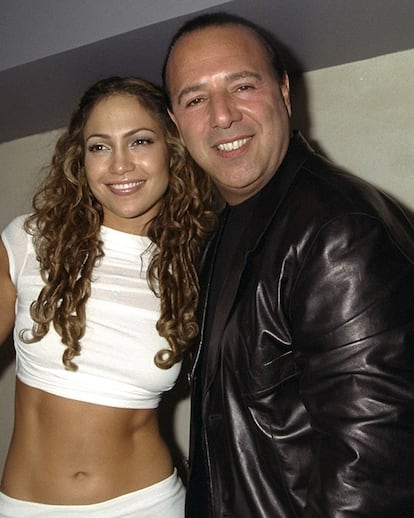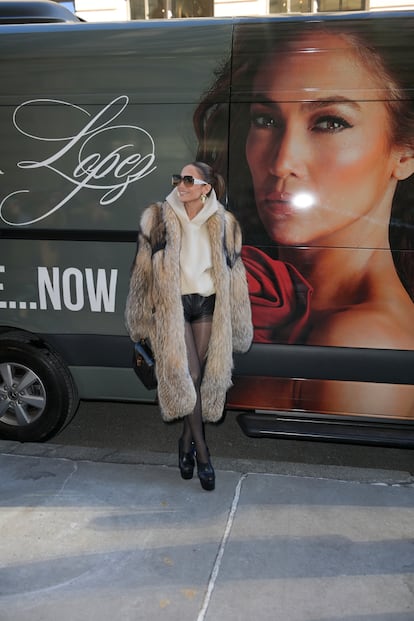‘Who does she think she is?’: Why the public has turned against Jennifer Lopez
The actress and singer’s career seemed to peak with her performance at the Super Bowl in 2020, but the failure of her last album, an overly egomaniacal documentary and questions over whether she sings her own music have damaged her popularity

This year Jennifer Lopez is celebrating her 25th anniversary as a global star. And it’s proving to be her most difficult one. The commercial results of her latest album have been disappointing, she has canceled seven dates of her U.S. tour due to poor ticket sales and she has opened the way for opinion columns and social media to question her image, career and personal history. This scrutiny was triggered by comments made by a singer who claims that Lopez barely sings in her most popular songs.
The first time Jennifer Lopez made headlines, her name appeared next to her price: $1 million. That’s what she earned for her role in Selena in 1997, making her the first Latina actress to earn that much. Journalists were shocked by the naturalness with which Lopez spoke about money, a taboo subject for Hollywood stars. “[Universal] thought they were going to get me cheap from the beginning, but I kept telling my agent, ‘No, no, no! Keep asking!’” she told Movieline. “People don’t believe it yet, but right now I’m very underpaid.” People, in fact, did not believe it: a virtual unknown asking to be paid like a Hollywood star. The news sparked a phrase that has haunted Lopez for years: “Who does she think she is?”
In 1999, when she was on the verge of becoming a movie star, Lopez made her debut as a singer with the album On The Six. The title of the record referred to the subway line she took to travel from the Bronx to castings in Manhattan. She has always made sure to include her humble beginnings in her narrative, selling it as a story of triumph over adversity, be it in the movie Maid in Manhattan (2002) or the song Jenny from the Block.

In 2003, Jennifer Lopez took her stardom to the next level. She became a brand name (Jlo) and released a perfume called Glow, moves that no other A-lister made at that time. She was the first person to have both a No.1 movie and an album. However, when she started dating Ben Affleck, the media met the news with headlines such as “Ben Affleck sleeps with the servants,” suggesting that Lopez was a maid. She was mocked in an episode of the TV show South Park, which joked that she presented herself as champion of the Latino population despite being unable to speak Spanish. She was also called “a mean-spirited bitch.” And Conan O’Brian also made fun of Lopez, with the chat show host telling the audience that he got “our script intern” to play Affleck and “our cleaning lady” to play Lopez in a sketch about the couple.
The couple’s exhibitionism, their outings to dinner in rhinestone-encrusted tracksuits, the celebration of their engagement with buckets of fried chicken and the rumor that Affleck had bought his fiancée a toilet with sapphires, rubies, pearls and a diamond (designed by himself and valued at $105,000) generated all kinds of classist criticism. It was claimed that no matter how much money she had, Lopez would never stop being ordinary. She was portrayed as a woman without class, who was obsessed with flaunting her newfound wealth. When rumor spread that she had insured her bottom for a million dollars (accusations she has denied on several occasions), people believed it not because it was true, but because it matched the image they had formed of her in their heads.
In 2003, an editorial in The Guardian titled Spinning Jenny called her “the most vilified woman in modern popular culture.” Lawrence Donegan described her as a symbol of “conspicuous consumption, of pushing the boundaries of public sexuality (Lopez’s outfit at the 2000 Grammy Awards redefined the word ‘revealing’), and of music artists no longer being simply entertainers but marketing brands.”

In the 2000s, there were three things every human being knew about Jennifer Lopez: her million-dollar butt, her delirious prenuptial agreement with Affleck (which required sex four times a week), and her diva-like whims. It was said that she demanded that no one address her or look at her, that her coffee be turned counterclockwise, that she did not interact directly with workers but communicated through an assistant, that she was stingy with tips, refused to work with people whose zodiac sign was Virgo, and demanded that her dressing rooms be entirely white. These last two rumors are the only ones to be confirmed: the first by Heather Morris (Glee) and the second by Spanish screenwriter Alberto Caballero, who in 1999 worked on the sketch show Noche de Fiesta (Party Night), which Lopez was a guest on. The public considered Jennifer Lopez, in addition to being a superstar, a parody of superstars.
But in the middle of the last decade, fourth-wave feminism embraced Jennifer Lopez. In 2020, her role as a stripper in Hustlers earned her the best reviews of her career and her performance alongside Shakira at the Super Bowl placed her on top of the world. In 2021, she sang America, The Beautiful at Joe Biden’s presidential inauguration and, during the last notes, broke into her song Let’s Get Loud. It was a tribute to the Latino population of the United States, so vilified by Donald Trump, and also a tribute to herself: no one could expect, when she was shaking her hips to that hit song in the summer of 2000, that the girl from the Bronx would go so far. So, how did she end up trapped in this image crisis?
It all started during the pandemic. Lopez shared videos of herself in lockdown, where her children were seen playing in a garden the size of a football stadium. To commemorate the anniversary of her popular song Love Don’t Cost A Thing (from 2000), she encouraged her fans to record themselves throwing away luxury objects on the beach to the rhythm of the song. But the majority of people, still confined, had neither luxury objects nor a beach on which to throw them away. For a woman determined to make authenticity part of her brand (she has two songs titled I’m Real), Lopez seemed wildly out of touch with reality.

This year, her mammoth audiovisual project This Is Me... Now (an album, a musical film and a documentary) received snide criticism, with Lopez accused of being narcissistic, egomaniacal and having no self-awareness. She financed the film herself and in the documentary she is seen thanking her team: “I expected the moon when we had the budget for like a pack a gum.” Lopez invested $20 million in the project. Even Jane Fonda appears in the documentary to tell her that it might not be a good idea to go back to oversharing her relationship with Ben Affleck, whom she ended up marrying in 2021.
The album spent a just week in the top 200 in the United States (it came in at No. 38 and then disappeared) and Lopez had to change up her tour: given the weak initial ticket sales, she decided to transform it into a greatest hits tour, which always has greater pull. The paradox is that Lopez has 253 million followers on Instagram, but this has not translated into people interested in seeing her perform live, with live being the key word.
The first person to suggest that Lopez didn’t really sing in her songs was another star: Mariah Carey. The two women were rivals in the early 2000s due to Tommy Mottola, Carey’s ex-husband and boss, who sabotaged her career by stealing her ideas and giving them to Lopez. That feud led to one of the internet’s favorite memes (a clip of Carey saying “I don’t know her”) and a string of taunts. When Carey said she slept three hours a day, interviewer Vanessa Grigoriadis told her that Lopez slept eight hours to get her beauty rest. “If I had the luxury of not actually having to sing me own songs, I’d do that too,” Carey replied. Nobody understood what she meant.
“when told jlo claims to get 8, mariah said if i had the luxury of not having to actually sing my own songs, i’d do that too.” https://t.co/0E3CtpkUpm https://t.co/E2gcNfghOh
— Azula’s Therapist (@ohgodjohnwhy) August 15, 2022
But today, many people understand the joke. Perhaps because confidentiality contracts are starting to expire (20 years have passed), singer Natasha Ramos took to TikTok to shed light on a rumor that had been bubbling on the fringes of the internet without making it into the mainstream conversation: that Jennifer Lopez doesn’t sing in most of her choruses.
Ramos, who has a voice very similar to Lopez’s, was hired to sing the demo of Jenny From The Block. The production team liked her voice so much that they asked her to record five more songs for the album This Is Me... Then (including the single I’m Glad). Ramos received $3,500 and a backup singer’s credit. However, as she claims and as the original demo demonstrates, it is her voice that appears in the final track. And not only in the choruses, it’s also her laugh and her yelling: “From the Bronx!” Lopez only sings in the verse.

This time the news did have repercussions. Several media outlets unearthed this open secret: in I’m Real and Ain’t It Funny it is Ashanti who is singing the chorus, in Play it is Christina Milian, and in the recent track Ain’t Your Mama it is Meghan Trainor. Several analysts have pointed out that in other big Lopez hits such as If You Had My Love, Love Don’t Cost a Thing and All I Have, Lopez’s voice is not heard in the chorus either. There is speculation that they were actually recorded by backup singers such as Shawnyette Harrell, Makeva Riddick, Canela Cox or Shalene Thomas. The theory is that these singers, with more range than Lopez, were used to cover up the star’s vocal shortcomings. It’s argued that while Lopez can sing a verse, her voice is not strong enough for a chorus.
In January, a clip went viral of rising star Ayo Edebiri (The Bear) questioning Lopez’s talent on a podcast in 2020. “Her whole career is one long scam,” said Edebiri. “She thinks she’s on multiple tracks, but it’s not her [...] A lot of the write-ups of the songs will be like, ‘J. Lo didn’t have time to make it to the studio.’ Like, ‘J. Lo was busy.’ Doing what? Not singing, obviously.”
In March, a video went viral of Lopez spitting gum into her assistant’s hand during the filming of Second Act in New York. The movie is from six years ago. The fact it is going viral now means that public opinion has turned against Lopez and the hunt has begun to find more incriminating material. She’s always been an easy target. “Performing authenticity is a razors-edge walk for anyone in the spotlight,” Álex Zaragoza said in a column published in the Los Angeles Times. “Audiences turn on you as soon as you become too annoying, too present, too cute, too anything, particularly if you’re a woman.”

In his analysis for The Ringer, Justin Charity writes that for much of her career, Lopez has been “an unsympathetic figure, a stone-cold climber whose missteps draw a great deal of schadenfreude and now something of a backlash.” He continued: “J.Lo is a talented entertainer, undeniably, even as she struggles to narrow her ambitions in response to that pesky, inevitable question: talented at what, exactly?”
In April, social media started to question her very origin story. At one point in the documentary The Greatest Love Story Never Told, the singer tousles her hair as she reminisces about her upbringing. “I like taking my hair out like this,” she says. “It reminds me, like, when I was 16 in the Bronx, running up and down the block. Crazy little girl who used to fucking be wild and no limits, all dreams.”
The 13-second clip sparked comments on social media such as: “That story of ‘I’m humble, I’m from the hood’ no longer works for you. Stop it.” Or “At this point the hood deserves copyrights” and “Ben has to listen to the history of the Bronx every day.”
But the comment that garnered the most attention was made by one of Lopez’s neighbors: “We both attended an all-girls high school in an Irish and Italian neighborhood, so you weren’t ‘running up and down the block,’” she said. Some even dusted off old school photos of Lopez, in which she appeared with short, perfectly combed hair. Others pointed out that her father was a computer scientist and her mother a teacher. In the era of instant fact-checking, it is more difficult to invent yourself.
Sign up for our weekly newsletter to get more English-language news coverage from EL PAÍS USA Edition
Tu suscripción se está usando en otro dispositivo
¿Quieres añadir otro usuario a tu suscripción?
Si continúas leyendo en este dispositivo, no se podrá leer en el otro.
FlechaTu suscripción se está usando en otro dispositivo y solo puedes acceder a EL PAÍS desde un dispositivo a la vez.
Si quieres compartir tu cuenta, cambia tu suscripción a la modalidad Premium, así podrás añadir otro usuario. Cada uno accederá con su propia cuenta de email, lo que os permitirá personalizar vuestra experiencia en EL PAÍS.
¿Tienes una suscripción de empresa? Accede aquí para contratar más cuentas.
En el caso de no saber quién está usando tu cuenta, te recomendamos cambiar tu contraseña aquí.
Si decides continuar compartiendo tu cuenta, este mensaje se mostrará en tu dispositivo y en el de la otra persona que está usando tu cuenta de forma indefinida, afectando a tu experiencia de lectura. Puedes consultar aquí los términos y condiciones de la suscripción digital.








































